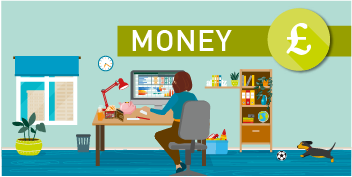Why poverty matters
The Covid pandemic shone a light on many pre-existing and deep-rooted inequalities; globally, nationally and locally. Within Kirklees and across the UK we found that individuals and communities who were living in greater deprivation were more likely to be negatively impacted by COVID-19. More deprived communities experienced higher COVID-19 infection rates and worse health-related outcomes. There were also indirect impacts related to the pandemic lockdowns and restrictions; deprived communities were more likely to be living in poor-quality housing, have less access to greenspace, experience worsened mental health and were more likely to be working in low-paid, insecure employment.
As we emerged from the shadow of the pandemic, we quickly moved into the cost-of-living crisis. Global events have plunged many of us into circumstances which are beyond our individual control. Whilst many more people are experiencing financial hardship, we also know that the cost of living crisis is having the most significant impact on people who were already living in persistent poverty.
Living in poverty has a significant impact on a broad range of health outcomes, including physical, mental and social health. The Joseph Rowntree Foundation describes poverty as:
"Not being able to heat your home, pay your rent, or buy the essentials for your children. It means waking up every day facing insecurity, uncertainty, and impossible decisions about money. It means facing marginalisation, and even discrimination, because of your financial circumstances. The constant stress it causes can lead to problems that deprive people of the chance to play a full part in society."
Poverty matters
At the heart of tackling poverty must be an understanding that those people who experience it first-hand should be at the centre of the process for influencing change and developing solutions. Poverty is a longstanding and complex policy and social issue, but more importantly it is a hard reality that many people are living with every day, including in Kirklees. Child poverty also has long-term 'scarring effects', meaning that those who experience child poverty have a greater risk of poor experiences as young adults and as they age.
We wanted to focus this report on the lived experiences of Kirklees residents. We cannot understand and address the issues presented by poverty unless we involve the real experts, those with direct experience of poverty themselves. This report captures these lived experiences for 12 of our residents, living across the borough in a range of circumstances. Where possible, we have used people's own words to tell their stories.
Poverty cannot be addressed by one thing alone, it requires national, regional and local commitment across systems. Because of these complexities it can often feel like a problem which is too difficult to solve. That is why this report ends with a 'call to action', practical local recommendations which should be considered and implemented at a local level across Kirklees. By listening to the stories of our residents and working together, we can help to reduce these inequalities and reduce the impact which poverty has on individuals, families and communities.
